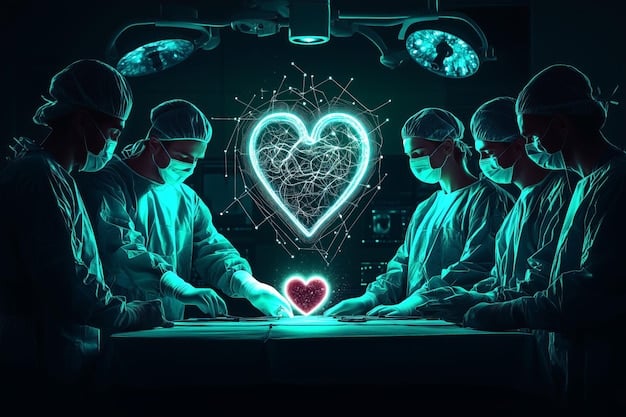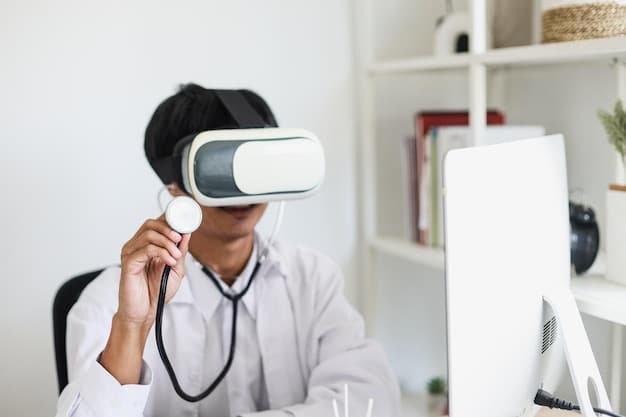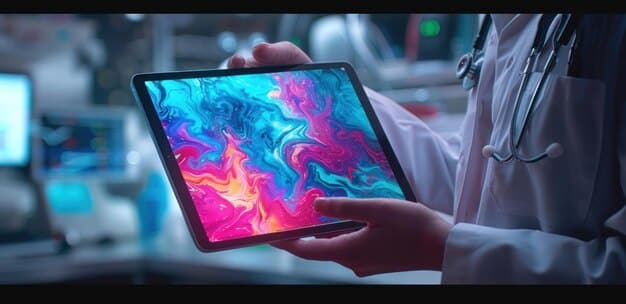The Future of Healthcare: Tech Skills Medical Professionals Need

The Future of Healthcare: Essential Tech Skills for Medical Professionals involves mastering telehealth, data analytics, AI, cybersecurity, and digital literacy. These skills enable medical professionals to deliver superior patient care and adapt to technological advancements.
The healthcare sector is undergoing a rapid transformation, driven by technological advancements. For medical professionals, adapting to the future of healthcare: essential tech skills for medical professionals is no longer optional but a necessity. This article explores the key tech skills that will define success in the evolving landscape of medicine.
Embracing these skills will not only enhance patient care but also empower professionals to thrive in an increasingly digital world. What are these skills, and how can medical professionals acquire them?
The Future of Healthcare: Essential Tech Skills for Medical Professionals
The relentless march of technology is reshaping every industry, and healthcare is no exception. For medical professionals, the future of healthcare: essential tech skills for medical professionals demands a new skill set. These skills are crucial for delivering efficient, effective, and patient-centered care. This section highlights why tech skills are paramount for those in medicine.

Why Tech Skills Matter in Modern Medicine
As healthcare becomes more data-driven and technologically advanced, medical professionals need to keep pace. Here’s why:
- Improved Patient Outcomes: Tech skills enable better diagnostics, treatment planning, and personalized care, leading to improved patient outcomes.
- Enhanced Efficiency: Digital tools streamline workflows, reduce administrative burdens, and allow healthcare providers to focus on patient care.
- Better Collaboration: Technology facilitates seamless communication and collaboration among healthcare teams, improving coordination and decision-making.
- Continuous Learning: The healthcare landscape is constantly evolving, and tech skills are essential for staying updated with the latest advancements and best practices.
In conclusion, embracing technology isn’t just about keeping up with trends; it’s about delivering superior care and making a meaningful impact in an evolving healthcare landscape. The shift towards the future of healthcare: essential tech skills for medical professionals signifies a commitment to progress and improved patient outcomes.
Telehealth Proficiency
Telehealth has rapidly transformed healthcare delivery, providing remote access to medical services. For medical professionals, proficiency in telehealth technologies is a crucial aspect of the future of healthcare: essential tech skills for medical professionals. Understanding and utilizing telehealth platforms effectively is now a core competency.
Mastering Telehealth Platforms
Telehealth involves more than just video conferencing. It requires understanding various platforms and tools to deliver high-quality remote care.
- Video Conferencing: Proficiency in using video conferencing platforms like Zoom, Skype, and specialized telehealth systems.
- Remote Monitoring: Ability to use remote monitoring devices and interpret patient data remotely.
- Electronic Health Records (EHR) Integration: Seamlessly integrating telehealth platforms with EHR systems for comprehensive patient records.
- HIPAA Compliance: Ensuring all telehealth practices comply with HIPAA regulations to protect patient privacy.
Telehealth is no longer a niche service but a core component of modern healthcare. Proficiency in these technologies is essential for providing convenient, accessible, and effective care to patients remotely. As the future of healthcare: essential tech skills for medical professionals become more intertwined with digital solutions, telehealth proficiency will stand out as a key determinant of success.
Data Analytics in Healthcare
Data analytics is transforming healthcare by providing valuable insights for improving patient care and operational efficiency. Medical professionals who can leverage data analytics tools are better equipped to make informed decisions and drive positive outcomes. In the future of healthcare: essential tech skills for medical professionals, data analytics is a fundamental competency.
Leveraging Data for Better Healthcare
Understanding how to collect, analyze, and interpret data is crucial for modern medical professionals. Data analytics skills involve several key areas:
* **Data Collection:** Understanding how to gather patient data from various sources, including EHRs, wearable devices, and patient surveys.
* **Statistical Analysis:** Using statistical methods to identify trends, patterns, and correlations in healthcare data.
* **Data Visualization:** Creating visual representations of data to communicate insights effectively to colleagues and patients.
* **Predictive Modeling:** Developing models to predict patient outcomes, identify at-risk populations, and optimize resource allocation.
In essence, data analytics empowers medical professionals to move beyond traditional practices and embrace a data-driven approach to healthcare. As the future of healthcare: essential tech skills for medical professionals become more dependent on data, the ability to harness its power will be indispensable.
Artificial Intelligence (AI) Applications
Artificial intelligence (AI) is revolutionizing healthcare, offering tools and solutions that enhance diagnostics, treatment planning, and patient care. For medical professionals, understanding AI applications is a cornerstone of the future of healthcare: essential tech skills for medical professionals. AI’s potential to improve healthcare outcomes is immense.
Understanding AI in Medicine
AI is not meant to replace medical professionals but to augment their capabilities. Here’s how AI is being used in healthcare:
* **Diagnostic Tools:** AI-powered tools can analyze medical images, such as X-rays and MRIs, to detect diseases earlier and more accurately.
* **Personalized Treatment Plans:** AI algorithms can analyze patient data to create customized treatment plans tailored to individual needs.
* **Drug Discovery:** AI accelerates the drug discovery process by identifying potential drug candidates and predicting their effectiveness.
* **Robotic Surgery:** Robots enhance surgical precision and reduce recovery times, improving patient outcomes.
Medical professionals who understand how to leverage AI tools are better positioned to provide optimal care and improve patient outcomes. Embracing AI is a critical aspect of adapting to the future of healthcare: essential tech skills for medical professionals.

Cybersecurity Awareness
With the increasing digitization of healthcare, cybersecurity threats are a growing concern. Protecting patient data and maintaining the integrity of healthcare systems requires a strong understanding of cybersecurity practices. For medical professionals, cybersecurity awareness is an essential component of the future of healthcare: essential tech skills for medical professionals.
Protecting Patient Data in a Digital World
Cybersecurity awareness involves understanding the threats and implementing best practices to safeguard sensitive information. Key areas include:
* **Data Encryption:** Understanding how to encrypt patient data to prevent unauthorized access.
* **Phishing Awareness:** Recognizing and avoiding phishing scams that can compromise sensitive information.
* **Password Management:** Implementing strong password policies and using multi-factor authentication.
* **Incident Response:** Knowing how to respond to cybersecurity incidents and report breaches promptly.
As healthcare becomes more reliant on digital systems, the importance of cybersecurity cannot be overstated. Medical professionals play a crucial role in protecting patient data and maintaining the trust of their patients. Prioritizing cybersecurity is a vital aspect of preparing for the future of healthcare: essential tech skills for medical professionals.
Digital Literacy
Digital literacy is the foundation upon which all other tech skills are built. It involves the ability to use digital technologies effectively and critically. For medical professionals, digital literacy is not just about using computers; it’s about staying informed, communicating effectively, and adapting to new technologies. Mastering digital literacy is paramount in the future of healthcare: essential tech skills for medical professionals.
Building a Strong Foundation in Digital Skills
Digital literacy encompasses a range of skills that are essential for navigating the digital world. These include:
* **Information Literacy:** Evaluating the credibility and relevance of online information.
* **Communication and Collaboration:** Using digital tools to communicate effectively with colleagues and patients.
* **Problem Solving:** Identifying and solving technical issues that may arise in a digital environment.
* **Continuous Learning:** Staying updated with the latest technological advancements and best practices.
Digital literacy empowers medical professionals to use technology effectively to improve patient care and enhance their professional development. Developing strong digital literacy skills is a crucial step in preparing for the future of healthcare: essential tech skills for medical professionals.
| Key Point | Brief Description |
|---|---|
| 💻 Telehealth | Remote patient care using digital platforms. |
| 📊 Data Analytics | Analyzing data for better decisions. |
| 🤖 AI in Medicine | Using AI for diagnostics and personalization. |
| 🔒 Cybersecurity | Protecting patient data from digital threats. |
FAQ
Tech skills improve patient outcomes, enhance efficiency, and enable better collaboration among healthcare teams. In the future of healthcare: essential tech skills for medical professionals, these skills are fundamental for optimal care.
Telehealth involves remote delivery of healthcare services via digital platforms. It’s crucial for expanding access to care, especially for patients in remote areas or those with mobility issues.
AI enhances diagnostics, treatment planning, and drug discovery. AI tools analyze medical images, create personalized treatment plans, and accelerate the identification of potential drug candidates, as the future of healthcare: essential tech skills for medical professionals becomes increasingly reliant on such technologies.
Main risks include data breaches, phishing scams, and ransomware attacks. Healthcare providers must implement robust security measures to protect patient data and maintain system integrity.
Medical professionals can improve digital literacy through continuous learning, online courses, and hands-on experience with digital tools. It’s important to stay updated with the latest tech trends, as the future of healthcare: essential tech skills for medical professionals evolve.
Conclusion
In conclusion, as technology continues to reshape the healthcare landscape, medical professionals must embrace the future of healthcare: essential tech skills for medical professionals. Proficiency in telehealth, data analytics, AI, cybersecurity, and digital literacy is crucial for delivering optimal patient care.
By investing in these skills, medical professionals can not only improve patient outcomes but also enhance their professional development and thrive in an increasingly digital world. The journey toward mastering these skills is a continuous one, requiring dedication, adaptability, and a commitment to lifelong learning.